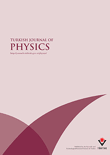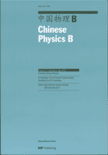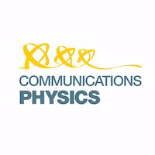
JOURNAL OF THE KOREAN PHYSICAL SOCIETY
metrics 2024
Your Gateway to the Latest in Physics and Astronomy
Introduction
JOURNAL OF THE KOREAN PHYSICAL SOCIETY is a prominent academic journal dedicated to advancing the field of physics, published by the prestigious Korean Physical Society. With its extensive contribution to the scientific community since its inception in 1996, this journal serves as an essential platform for the dissemination of innovative research findings in various branches of physical science. Despite its current categorization in Q4 and a ranking reflecting its early-stage impact relative to peers, it remains a valuable resource for researchers, professionals, and students eager to explore developments in general physics and astronomy. The journal is accessible in both print and electronic formats, making it convenient for a global audience. Each issue aims to foster collaboration and knowledge-sharing within the field, ensuring that it remains relevant and instrumental in shaping future research directions. Located in South Korea, the journal continues to nurture a vibrant academic community, contributing to the ongoing dialogue in the global scientific arena.
Metrics 2024
 0.21
0.21 0.80
0.80 0.60
0.60 54
54Metrics History
Rank 2024
Scopus
IF (Web Of Science)
JCI (Web Of Science)
Quartile History
Similar Journals

Frontiers of Physics
Transforming Theoretical Insights into Practical AdvancementsFrontiers of Physics, published by Higher Education Press, is a premier open-access journal dedicated to fostering innovative research and excellence within the field of physics. With an ISSN of 2095-0462 and an E-ISSN of 2095-0470, this rapidly growing journal has established itself as a valuable platform for disseminating cutting-edge findings, covering a diverse range of topics from theoretical frameworks to experimental advancements. Notably, Frontiers of Physics has achieved an impressive Q1 ranking in the 2023 Scopus Quartiles for Physics and Astronomy, securing a competitive 5th out of 81 positions in its category, reflecting a high impact factor that underscores its importance to the scientific community. Since its inception in 2011 and continuing through 2024, the journal aims to bridge the gap between academia and industry, encouraging collaboration among researchers, professionals, and students alike. Its commitment to open access ensures that high-quality research is readily accessible, thereby promoting knowledge sharing and advancement in the global physics community. Explore the potential of your research in Frontiers of Physics, where the future of physics flourishes.

Turkish Journal of Physics
Elevating academic discourse in physics and beyond.Turkish Journal of Physics, established in 1994 and published by the Tubitak Scientific & Technological Research Council Turkey, is a prominent platform for the dissemination of innovative research in the field of physics and related areas. With an ISSN of 1300-0101 and an E-ISSN of 1303-6122, this journal has carved a niche in the academic community, evidenced by its ranking within the Q3 category in the 2023 evaluation of Physics and Astronomy. As it converges its published works toward the year 2024, researchers and scholars are encouraged to engage with its rich repertoire of studies that covers general physics and astronomy, currently holding a Scopus rank of #96 out of 243, placing it in the top 60th percentile. The Turkish Journal of Physics serves as a vital resource for advancing knowledge, fostering collaborative research, and providing insights into contemporary advancements in the discipline. While it operates under a subscription model, the quality and impact of its peer-reviewed articles make it an essential read for professionals and students alike, looking to stay informed on critical developments within the physics community.

Jurnal Fizik Malaysia
Connecting Minds, Expanding Horizons in Physics Research.Jurnal Fizik Malaysia is a prominent academic journal dedicated to advancing the field of physics, published by the esteemed Institut Fizik Malaysia. With an aim to foster knowledge dissemination and research collaboration among physicists, the journal serves as a vital platform for original research articles, reviews, and technical notes that cover various sub-disciplines of physics. Although the journal operates under a traditional subscription model, its commitment to quality has been bolstered by a rigorous peer-review process, ensuring high academic standards. Researchers and students in Malaysia and beyond are encouraged to engage with this journal, contributing to a deeper understanding of physical sciences and its applications. Moreover, with its ISSN 0128-0333, Jurnal Fizik Malaysia continues to play a significant role in the scientific community, enhancing visibility and accessibility for local and international research outputs in the ever-evolving landscape of physics.

Chinese Physics B
Connecting scholars through innovative physics discoveries.Chinese Physics B, published by IOP Publishing Ltd, is a distinguished journal in the field of Physics and Astronomy, offering a platform for researchers to disseminate cutting-edge studies and advancements. With an ISSN of 1674-1056 and an E-ISSN of 2058-3834, this journal emphasizes open access, ensuring that groundbreaking research is readily available to a global audience. Reflecting its commitment to quality, Chinese Physics B is categorized in the Q3 quartile (2023) in its subject area and ranks 118 out of 243 among its peers in general physics and astronomy according to Scopus, placing it in the 51st percentile. Publishing since 2008, the journal not only maintains a rigorous peer-review process but also aims to foster collaboration among academics in various physics disciplines. With its base in the United Kingdom, Chinese Physics B remains a crucial resource for those seeking to stay abreast of developments in the diverse world of physics.

Communications Physics
Fostering dialogue among the brightest minds in physics.Communications Physics is a premier open access journal published by Nature Portfolio, dedicated to disseminating high-quality research in the field of Physics and Astronomy. Since its inception in 2018, the journal has rapidly established itself as a vital platform for innovative scientific communication, boasting an impressive Impact Factor and achieving Q1 status in the 2023 category of Physics and Astronomy (miscellaneous). With a Scopus rank of #31 out of 243, placing it within the 87th percentile, Communications Physics attracts a global audience of researchers, professionals, and students eager to engage with cutting-edge findings. The journal supports open access, ensuring that research is freely available to the public, which enhances its visibility and encourages broader discussions within the scientific community. Located in Berlin, Germany, Communications Physics aims to bridge the gap between various disciplines within physics, fostering interdisciplinary collaboration and inspiring future research endeavors.

CHINESE PHYSICS LETTERS
Your Gateway to High-Impact Physics ResearchChinese Physics Letters is a prestigious journal published by IOP Publishing Ltd, based in the United Kingdom. Since its inception in 1984, the journal has served as a vital platform for disseminating impactful research in the field of physics, achieving a noteworthy Q1 ranking in the category of Physics and Astronomy (miscellaneous) as of 2023. Renowned for its rapid publication process, this journal is dedicated to providing a forum for high-quality, concise articles that address innovative theoretical and experimental findings relevant to both the academic community and industry practitioners. With an impressive Scopus rank of #52 out of 243, placing it in the 78th percentile, Chinese Physics Letters continues to influence the global physics landscape. Researchers, professionals, and students alike find this journal indispensable for staying abreast of the latest developments and trends in physics.

Recent Contributions to Physics
Bridging disciplines with cutting-edge physics research.Recent Contributions to Physics is a distinguished journal published by AL-FARABI KAZAKH NATIONAL UNIVERSITY, focusing on the latest developments and research breakthroughs in the field of physics. Established as an open access journal since 2008, it aims to facilitate the wide dissemination of knowledge by allowing researchers, professionals, and students worldwide to access high-quality content without barrier. Featuring a diverse range of topics within physics, from theoretical innovations to practical applications, this journal is an essential resource for anyone seeking to stay at the forefront of scientific advancement. Its commitment to quality and accessibility not only enhances the impact of research in the scientific community but also promotes collaboration across disciplines. With its dedication to fostering a vibrant academic dialogue, Recent Contributions to Physics is poised as a key contributor to the future of physics research.

INDIAN JOURNAL OF PHYSICS
Fostering Knowledge Exchange in the World of PhysicsINDIAN JOURNAL OF PHYSICS, published by the Indian Association for Cultivation of Science, serves as a pivotal platform for researchers and scholars in the field of physics and astronomy. With its ISSN 0973-1458 and E-ISSN 0974-9845, this journal is committed to presenting innovative research and developments across diverse topics in physics, covering both theoretical and experimental studies. The journal has made its mark in the academic community, evidenced by its classification in the Q3 category within the Physics and Astronomy domain as of 2023, and ranks #100 out of 243 in the Scopus curated database, placing it in the 59th percentile. Spanning from 2005 to 2024, the INDIAN JOURNAL OF PHYSICS aims to foster knowledge exchange and stimulate discussions among physicists and scientific enthusiasts. Whether you are a researcher looking to publish your findings, a professional seeking updates in your field, or a student eager to explore varying aspects of physics, this journal is an invaluable resource contributing significantly to the understanding and advancement of physics in India and beyond.

JETP LETTERS
Pioneering Research, Inspiring InnovationJETP LETTERS, published by MAIK NAUKA/INTERPERIODICA/SPRINGER, is a prestigious journal in the field of physics and astronomy, which plays a pivotal role in disseminating groundbreaking research and innovative ideas since its inception in 1969. With an ISSN of 0021-3640 and an E-ISSN of 1090-6487, this journal aligns well with the interests of both seasoned researchers and emerging scholars, having achieved a 2023 category rank of Q3 for miscellaneous topics within physics and astronomy. Located in the United States at 233 SPRING ST, NEW YORK, NY 10013-1578, JETP LETTERS serves as a critical resource for its readership, offering exclusive insights and advancements across diverse areas of physics. While not open access, it hosts a collection of articles that refine theoretical approaches and experimental methods, providing both knowledge and inspiration to professionals and academics seeking to make impactful contributions to the scientific community. The journal’s quality is reflected in its Scopus ranking, where it stands at 39 out of 81 in the multidisciplinary category, placing it in the 52nd percentile, thus underscoring its significance and reliability as a scholarly outlet.

PHYSICAL REVIEW LETTERS
Unveiling Breakthroughs in Physical SciencePhysical Review Letters, published by the American Physical Society, is a premier journal in the field of Physics and Astronomy renowned for its rapid dissemination of high-impact research findings. With a distinguished history dating back to 1958 and an impressive ranking of #13 out of 243 in the general physics category, it stands proudly within the Q1 quartile, placing it in the top 6% of journals in its field. The journal focuses on brief reports of significant fundamental research across all areas of physics, making it an essential resource for researchers, professionals, and students seeking to stay at the forefront of developments in their field. Although Physical Review Letters does not offer open access options, its rigorous peer-review process ensures a high standard of quality and relevance in its published articles. With an unwavering commitment to advancing the understanding of physical science, this journal is indispensable for those looking to make a genuine impact in their research endeavors.